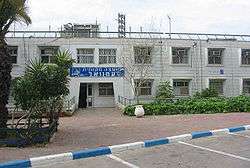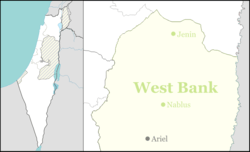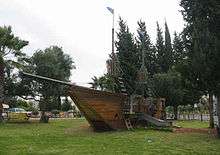Immanuel (town)
Immanuel, (Hebrew: עִמָּנוּאֵל, IPA: i.maˌnuˈel) also spelled Emmanuel or Emanuel, is an Israeli settlement organized as a local council located in the West Bank. Immanuel was established in 1983.[2] In 2018 it had a population of 3,693; its jurisdiction is spread out over 2,750 dunams (2.75 km²).
Immanuel
| |
|---|---|
| Hebrew transcription(s) | |
| • ISO 259 | ʕimmanuˀel |
| • Translit. | Imanu'el |
 Headquarters of Immanuel Local Council | |
 Immanuel | |
| Coordinates: 32°9′42.71″N 35°8′13.98″E | |
| Region | West Bank |
| District | Judea and Samaria Area |
| Government | |
| • Type | Local council |
| • Head of Municipality | Ezra Gershi |
| Area | |
| • Total | 2,750 dunams (2.75 km2 or 1.06 sq mi) |
| Population (2018)[1] | |
| • Total | 3,693 |
| • Density | 1,300/km2 (3,500/sq mi) |
| Name meaning | God is with us |

The international community considers Immanuel along with all other Israeli settlements in the West Bank illegal under international law, but the Israeli government disputes this.[3][4]
History
According to ARIJ, in order to construct Immanuel, Israel confiscated land from two nearby Palestinian villages;
- 951 dunams from Deir Istiya,[5]
- 163 dunams from Immatain.[6]
Following its founding in 1983, Immanuel was declared a local council in 1985. It was named after the symbolic child's name in Isaiah 7:14.[7]
Its first head of council was Oded Alon. Immanuel's current head of council is Yeshayahu Ehrenreich, while its acting mayor is Ezra Gershi.[8]
In the 1990s, Immanuel was undergoing a major expansion, but the Oslo Accords discouraged investors and construction firms from continuing to build. As a result, a major portion of present-day Immanuel consists of unfinished steel structures and concrete. Land value is also extremely low, often four to six times lower than in central Israeli towns and cities.
While Immanuel has a modest light industrial area which provides work for Israelis and Palestinians, there are otherwise not many more local career opportunities that are not related to education or Torah study; therefore many of its residents commute to nearby Ariel, Jerusalem and Bnei Brak for employment. The town is served by a public transportation route run by the Dan Bus Company.[9]
Status under international law
The international community considers Israeli settlements including Immanuel, to be in violation of the Fourth Geneva Convention's prohibition on the transfer of an occupying power's civilian population into occupied territory.[10] Israel disputes that the Fourth Geneva Convention applies to the West Bank region as it had not been legally held by a sovereign nation prior to Israel taking control of it, and the settlement population was not forcibly transferred but rather moved voluntarily. This view has been rejected by the International Court of Justice and the International Committee of the Red Cross.[11]
Violence
On December 12, 2001, members of the Hamas and Fatah movements detonated two roadside bombs on the commuter Dan bus line 189 as it slowed to a stop 70 meters from the entrance of the settlement. Three terrorists began firing automatic weapons and threw hand-grenades at the bus as 11 people were killed and 26 others suffered injuries.[12][13]
In 2002, the town was again the site of an ambush attack by Palestinian militants in which 9 people were killed and 20 others injured.[14] Two 20-kilo bombs were set off by Palestinians disguised as IDF officers at the entrance of the settlement, damaging a commuting bus from the city of Bnei Brak. The militants then threw grenades at the bus and opened fire on the passengers and another vehicle behind the bus.[14]
Controversy
Beit Yaakov school segregation
In 2007, Immanuel became the site of a dispute over the alleged discrimination of students at the state-funded Beit Yaakov girls' school involving claims of segregation between Ashkenazi and Sephardi students. Attorney Mordechai Bass was sent by the Ministry of Education in January 2008 to investigate the allegations of discrimination. Bass concluded: "I am convinced that there is no ethnic discrimination. ... When ethnic discrimination actually occurs, we must combat it with all our might. I express my sorrow about complaints like these—thrown in the air—that increase hatred among Israel, and are totally baseless.[15] The Israeli Supreme Court unanimously ruled in 2009 that it considered the division as a form of prejudice which should be abolished.[16]
Malka Leifer
In 2016, Malka Leifer, a former high school principal facing 74 counts of alleged sex abuse of her pupils in Australia, returned to live in Immanuel, but was rearrested in 2018, jailed, and is facing extradition. Her extradition has been delayed for years due to her feigning of mental health issues.[17][16] In June 2018, Emmanuel was cited as a "haven for paedophiles" by The Sydney Morning Herald, which exposed further alleged child sexual abuse there by Leifer, committed "without consequence."[18] Leifer's husband, Rabbi Yaakov Yosef (Jacob) Leifer, fled to Israel with her and reportedly heads the small Chust Hassidic community in Immanuel, where his wife was arrested.[19]
References
- "Population in the Localities 2018" (XLS). Israel Central Bureau of Statistics. 25 August 2019. Retrieved 26 August 2019.
- One kid in Immanuel. Haaretz. 6 February 2010. Retrieved 2012-01-01.
- "The Geneva Convention". BBC News. 10 December 2009. Retrieved 2010-11-27.
- Bulldozers begin Ariel barrier. BBC. 16 June 2004. Retrieved 2011-12-31.
- Deir Istiya Town Profile, ARIJ, p. 18
- Immatin Village Profile (including Far’ata Locality) ARIJ, p. 17
- Carta's Official Guide to Israel and Complete Gazetteer to all Sites in the Holy Land. (3rd edition 1993) Jerusalem, Carta, p.222, ISBN 965-220-186-3 (English)
- Gabrielle Weiniger, 'A haven for paedophiles: The ultra-Orthodox settlement where Malka Leifer hides,' Sydney Morning Herald 30 June 2018,
- Emmanuel bus route is still problematic. Haaretz. 19 December 2001. Retrieved 2012-01-01.
- The settlers' struggle BBC News. 19 December 2003. Retrieved 2012-01-01.
- Legal Consequences of the Construction of a Wall in the Occupied Palestinian Territory Archived 2010-07-06 at the Wayback Machine International Court of Justice, 9 July 2004. pp. 44-45
- 10 Israelis killed in W. Bank ambush; Hamas, Fatah claim attack. Haaretz. 12 December 2001. Retrieved 2012-01-01.
- Terror victims 2002. Israel Ministry of Foreign Affairs. Retrieved 2012-01-01.
- "Terrorist Attack on Bus at Emmanuel". Israeli Foreign Ministry. 2002-07-16. Retrieved 2008-10-25.
- https://drive.wps.com/docs/1FPz9kPWe
- Lopin, Yerachmiel (2016-07-06). "Breaking- Extradition-Evading, Alleged Serial Child Molester Malka Leifer Now in Immanuel, Israel". FRUM FOLLIES by Yerachmiel Lopin. Retrieved 2016-07-14.
- Berger, Yotam (12 February 2018). "Israel Arrests Australian Principal Suspected of Abusing ultra-Orthodox Schoolgirls". Haaretz. Archived from the original on 12 February 2018. Retrieved 12 February 2018.
- "A haven for paedophiles: The ultra-Orthodox settlement where Malka Leifer hides". Sydney Morning Herald. 2017-06-30. Retrieved 2018-07-10.
- Sharon, Jeremy (December 6, 2019). "How Malka Leifer has evaded justice for over a decade". The Jerusalem Post. Retrieved 4 February 2020.
External links
- Official website (in Hebrew)
- Immanuel on YouTube